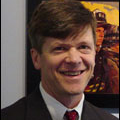"Legislation has been put on the fast track." That's not a term Congress often uses anymore. These days with partisan politics deeply imbedded in our political systems, it's a small wonder that the wheels of government continue to spin.
We all know that Congress and the Obama Administration are being consumed by issues of monumental significance - the recession, health care legislation, the H1N1 epidemic and the war in Afghanistan. I certainly can't recall during my lifetime when so many issues of major consequence faced our nation. It is an extraordinary time to be working in Washington D.C. and seeing how our elected leaders are navigating their ways through these turbulent waters.
While the fast track has been closed for repairs, legislation still must find its way through Congress and onto the desk of the president, including reauthorization of both the Assistance to Firefighters Grant (AFG) Program and the Staffing for Adequate Fire and Emergency Response (SAFER). Back in July, the House Science Committee conducted a hearing on the reauthorization of these two programs. Four organizations provided testimony on the merits of the programs -- International Association of Fire Fighters (IAFF), International Association of Fire Chief (IAFC), National Volunteer Fire Council (NVFC) and National Fire Protection Association (NFPA) -- and also offered recommendations for improvements. The individual testimony was compelling and clearly articulated the positions of the respective organizations; but together, it revealed some differences regarding core elements of the programs. Hence, Congress encouraged the organizations to meet amongst themselves and develop consensus recommendations for the reauthorization of both programs.
Seeking consensus is an art form, not a science. It requires an open mind and a willingness to compromise for the greater good of the cause. It requires that the right people be at the table - individuals with an open mind and a willingness to listen. And it requires patience and an understanding that consensus is synonymous with the term compromise. It is very seldom that you get everything you want when striving for consensus. But the important thing to remember is that your efforts are directed at the greatest good of the cause.
Following the hearing, the fire organizations convened a series of meetings in Washington in response to the congressional edict. Discussions were lively as representatives of the various groups offered recommendations for the reauthorization. There were general agreements at the outset on certain provisions, but not all. During the process, calls were being made by congressional offices, agency officials, organization members and the fire service media asking for updates. Now I know why the Cardinals lock themselves in a room and send a signal of white smoke when electing a Pope. Fewer distractions.
In the end, the representatives of the organizations reached an agreement on recommendations for reauthorization of the AFG and SAFER programs. The work is reflected in the legislation introduce by Congressman Harry Mitchell (AZ-5), a member of the House Science and Technology Committee. Does it contain everything sought individually by the IAFF, IAFC, NVFC or NFPA? No it doesn't. And for that reason they might be subject to criticism by certainly elements of their membership. But we must put this effort in its proper context.
The reason the fire service has received over $5 billion in direct federal support since 2000 is because the organizations have remained united in their support of the program and the overall needs of the fire service. As Winston Churchill once said, "There is only one thing worse than fighting with your allies and that's fighting without them."
The Congressional Fire Services Institute will continue to serve as the forum where the major fire service groups can conduct discussions on key fire service issues. While we are proud of our work in facilitating discussions on the reauthorization legislation, it is important for the fire service to understand how the process works in Washington, D.C. To remain effective and command the attention of Congress and the Administration, we must continue to work together in advancing consensus positions on those issues that impact all our members.
You can view the reauthorization legislation at http://www.cfsi.org/govt_affairs/govt_legislation.asp.
BILL WEBB, a Firehouse.com Contributing Editor, is the Executive Director of the Congressional Fire Services Institute (CFSI). Established in 1989, CFSI is a nonprofit, nonpartisan policy institute designed to enhance Congressional awareness about the concerns and needs of the fire and emergency services. In his capacity, Bill works closely with members of Congress and fire service leaders on developing federal legislation to improve the readiness of our nation's fire and emergency services. Previously, he served in the first Bush Administration as Director of Advance at the U.S. Departments of Education and Labor, traveling across the country and abroad organizing events for the Secretaries. To read Bill's complete biography and view his archived articles, click here.
About the Author

Bill Webb
Executive Director, CFSI
Bill Webb has served as executive director of the Congressional Fire Services Institute (CFSI) since 1995. CFSI is a nonprofit, nonpartisan policy institute designed to enhance congressional awareness about the concerns and needs of the fire and emergency services. As executive director, Webb works closely with members of Congress and fire service leaders to sustain support on Capitol Hill for programs and legislation that benefit our nation's fire and emergency services. Before joining CFSI, Webb worked for the Firefighter Combat Challenge as the project manager for the competition. He currently serves as vice chairman of the National Fallen Firefighters Foundation and is an honorary member of the Vienna Volunteer, the Delaware Volunteer Firefighters' Association and the International Association of Fire Fighters Local 36.